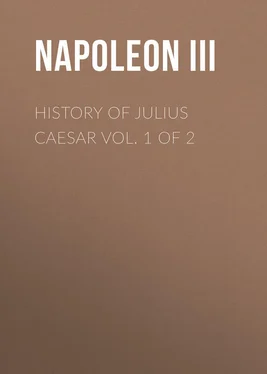Napoleon III - History of Julius Caesar Vol. 1 of 2
Здесь есть возможность читать онлайн «Napoleon III - History of Julius Caesar Vol. 1 of 2» — ознакомительный отрывок электронной книги совершенно бесплатно, а после прочтения отрывка купить полную версию. В некоторых случаях можно слушать аудио, скачать через торрент в формате fb2 и присутствует краткое содержание. Жанр: foreign_antique, foreign_prose, Биографии и Мемуары, на английском языке. Описание произведения, (предисловие) а так же отзывы посетителей доступны на портале библиотеки ЛибКат.
- Название:History of Julius Caesar Vol. 1 of 2
- Автор:
- Жанр:
- Год:неизвестен
- ISBN:нет данных
- Рейтинг книги:5 / 5. Голосов: 1
-
Избранное:Добавить в избранное
- Отзывы:
-
Ваша оценка:
- 100
- 1
- 2
- 3
- 4
- 5
History of Julius Caesar Vol. 1 of 2: краткое содержание, описание и аннотация
Предлагаем к чтению аннотацию, описание, краткое содержание или предисловие (зависит от того, что написал сам автор книги «History of Julius Caesar Vol. 1 of 2»). Если вы не нашли необходимую информацию о книге — напишите в комментариях, мы постараемся отыскать её.
History of Julius Caesar Vol. 1 of 2 — читать онлайн ознакомительный отрывок
Ниже представлен текст книги, разбитый по страницам. Система сохранения места последней прочитанной страницы, позволяет с удобством читать онлайн бесплатно книгу «History of Julius Caesar Vol. 1 of 2», без необходимости каждый раз заново искать на чём Вы остановились. Поставьте закладку, и сможете в любой момент перейти на страницу, на которой закончили чтение.
Интервал:
Закладка:
79
“Morals were so pure that, during two hundred and thirty years, no husband was known to repudiate his wife, nor any woman to separate from her husband.” (Plutarch, Parallel of Theseus and Romulus .)
80
Cicero admires the profound wisdom of the first kings in admitting the conquered enemies to the number of the citizens. “Their example,” he says, “has become an authority, and our ancestors have never ceased granting the rights of citizens to conquered enemies.” ( Oration for Balbus , xxxi.)
81
Roman colonies (coloniæ civium cum jure suffragii et honorum). – First period: 1-244 (under the kings).
Cænina (Sabine). Unknown.
Antemnæ (Sabine). Unknown.
Cameria (Sabine). Destroyed in 252. Unknown.
Medullia (Sabine). Sant’-Angelo . – See Gell., Topogr. of Rome , 100.
Crustumeria (Sabine). Unknown.
Fidenæ (Sabine). Ruins near Giubileo and Serpentina . Re-colonised in 326. Destroyed, according to an hypothesis of M. Madvig.
Collatia.
Ostia (the mouth of the Tiber). Ruins between Torre Bovacciano and Ostia .
Latin colonies (coloniæ Latinæ). – First period: 1-244 (under the kings).
We cannot mention with certainty any Latin colony founded at this epoch, from ancient authorities. The colonies of Signia and Circeii were both re-colonized in the following period, and we shall place them there.
82
“Tarquin embellished also the great circus between the Aventine and Palatine hills; he was the first who caused the covered seats to be made round this circus.” (Dionysius of Halicarnassus, III. 68.)
83
Titus Livius, I. 44. – “Immediately the centurions, whose centuries had taken flight, and the antesignani who had lost their standard, were condemned to death: some had their heads cut off; others were beaten to death. As to the rest of the troops, the consul caused them to be decimated; in every ten soldiers, he upon whom the lot fell was conducted to the place of execution, and suffered for the others. It is the usual punishment among the Romans for those who have quitted their ranks or abandoned their standards.” (Dionysius of Halicarnassus, IX. 1.)
84
“Romulus placed upon their hair a crown of laurels.” (Plutarch, Romulus , XX.)
85
“The Senate and the people decreed to King Tarquin the honours of the triumph.” ( Combat of the Romans and Etruscans , Dionysius of Halicarnassus, III. 60.) – “An ovation differs from a triumph, first, because he who receives the honours of it enters on foot at the head of the army, and not mounted in a car; secondly, that he has neither the crown of gold, nor the toga embroidered with gold and of different colours, but he carries only a white trabea bordered with purple, the ordinary costume of the generals and consuls. Besides having only a crown of laurel, he does not carry a sceptre. This is what the little triumph has less than the great; in all other respects there is no difference.” (Dionysius of Halicarnassus, V. 47.)
86
Romulus kills Acron, routs the enemies, and returns to offer to Jupiter Feretrius the opima spolia taken from that prince .
“After Romulus, Cornelius Cossus was the first who consecrated to the same gods similar spoils, having slain with his own hand, in a combat where he commanded the cavalry, the general of the Fidenates.
“We must not separate the example of M. Marcellus from the two preceding. He had the courage and intrepidity to attack on the banks of the Pô, at the head of a handful of horsemen, the king of the Gauls, though protected by a numerous army; he struck off his head, and carried off his armour , of which he made an offering to Jupiter Feretrius. (Year of Rome 531.)
“The same kind of bravery and combat signalised T. Manilius Torquatus, Valerius Corvus, and Scipio Æmilianus. These warriors, challenged by the chieftains of the enemies, made them bite the dust; but, as they had fought under the auspices of a superior chief, they did not offer their spoils to Jupiter.” (Year of Rome 392, 404, 602.) (Valerius Maximus, III. 2, §§ 3, 4, 5, 6.)
87
“Tarquin divided the seats (of the great circus) among the thirty curiæ, assigning to each the place which belonged to him.” (Dionysius of Halicarnassus, III. 68.) – “It was then (after the war against the Latins) that the site was chosen which is now called the great circus. They marked out in it the particular places for the senators and for the knights.” (Titus Livius, I. 35.)
88
“The hundred senators were divided into ten decaries, and each chose one of its members to exercise this authority. The power was collective: one alone carried the insignia of it, and walked preceded by the lictors. The duration of this power was for five days, and each exercised it in turn … The plebs was not long before it began to murmur. Its servitude had only been aggravated; instead of one master, it had a hundred. It appeared disposed to suffer only one king, and to choose him itself.” (Titus Livius, I. 17.)
89
“For the rest, this liberty consisted at first rather in the annual election of the consuls than in the weakening of the royal power. The first consuls assumed all its prerogatives and all its insignia; only it was feared that, if both possessed the fasciæ, this solemnity might inspire too much terror, and Brutus owed to the deference of his colleague the circumstance of possessing them first.” (Titus Livius, II. 1.)
90
“The death of Melius was justified,” said Quinctius, “to appease the people, although he might be innocent of the crime of aspiring to the kingly power.” (Titus Livius, IV. 15.)
91
“From these inflexible hearts came a sentence of death, which was odious to the judges themselves.” (Titus Livius, VI. 20.)
92
Discourse on Titus Livius , I. 5.
93
Proofs of the disagreement of the two consuls: “Cassius brought secretly as many Latins and Hernici as he possibly could to have their suffrages; there arrived in Rome such a great number, that in a short time the town was full of strangers. Virginius, who was informed of it, caused a herald to proclaim in all the public places that all those who had no domicile in Rome should withdraw immediately; but Cassius gave orders contrary to those of his colleague, forbidding any one who had the right of Roman freedom to quit the town until the law was confirmed and received.” (Year of Rome 268.) (Dionysius of Halicarnassus, VIII. 72.) – “Quinctius, more indulgent than his colleague, willed the concession to the people of all their just and reasonable demands; Appius, on the contrary, was willing to die rather than to yield.” (Year of Rome 283.) (Dionysius of Halicarnassus, IX. 48.)
94
“The two consuls were of the most opposite tempers, and were always in discord ( dissimiles discordesque ).” (Titus Livius, XXII. 41.) – “While they lost their time in quarrels rather than in deliberations.” (Titus Livius, XXII. 45.)
95
Titus Livius, XXI. 52. – Dio Cassius, Fragments , CCLXXI. edit. Gros.
96
Titus Livius, XXI. 52.
97
Интервал:
Закладка:
Похожие книги на «History of Julius Caesar Vol. 1 of 2»
Представляем Вашему вниманию похожие книги на «History of Julius Caesar Vol. 1 of 2» списком для выбора. Мы отобрали схожую по названию и смыслу литературу в надежде предоставить читателям больше вариантов отыскать новые, интересные, ещё непрочитанные произведения.
Обсуждение, отзывы о книге «History of Julius Caesar Vol. 1 of 2» и просто собственные мнения читателей. Оставьте ваши комментарии, напишите, что Вы думаете о произведении, его смысле или главных героях. Укажите что конкретно понравилось, а что нет, и почему Вы так считаете.












